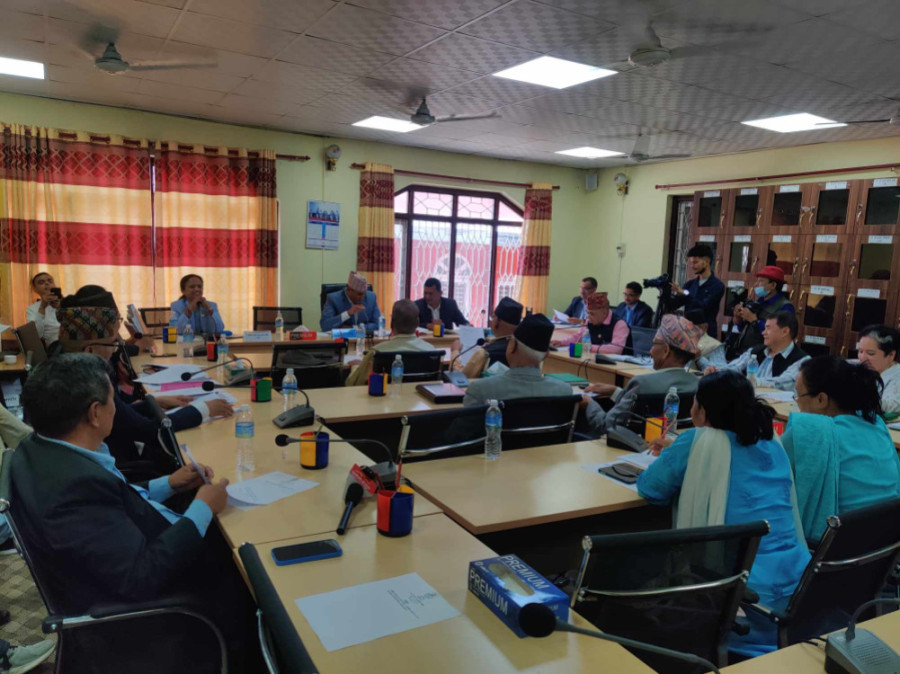Politics
NGO-sponsored meals kill House committee’s appetite for deliberations
Ex-minister Ramesh Nath Pandey calls for ending the influence of external elements in lawmaking.
Purushottam Poudel
Should non-governmental organisations be allowed in legislative committee deliberations? This age-old question has divided experts and legislators. While NGOs have long been active in Nepal’s lawmaking process, controversy flared anew when NGO representatives were found attending Sunday’s session of the State Affairs and Good Governance Committee of Parliament without the knowledge of many lawmakers.
The committee was scheduled to discuss the federal civil code amendment bill with expert input from Umesh Mainali, the former chief of the Public Service Commission. Deputy Prime Minister and Home Minister Rabi Lamichhane was also present at the meeting. However, the meeting took an unexpected turn when lawmakers noticed an elaborate breakfast and lunch arrangement, a departure from usual tea and simple fare. This led to questions about the sponsorship.
Upon noticing the breakfast arrangement in the committee hall, Nepali Congress lawmaker Hridaya Ram Thani approached the committee president for clarification. It was revealed that the breakfast was arranged by an NGO, whose representatives were present in the meeting hall, leading to an abrupt adjournment of the meeting without any agenda being discussed.
“After knowing that the lunch was sponsored by an NGO, Home Minister Lamichhane left the meeting hall,” Thani told the Post. Before leaving, Lamichhane also questioned the committee chair stating that it was unacceptable to hold a meeting with the breakfast sponsored by an NGO, Thani said, quoting Lamichhane.
The National Forum for Parliamentarians on Population and Development (NFPPD), an NGO, had sponsored the breakfast and lunch for lawmakers. Two representatives of the NGO, Ram Guragain and Arinika Rai, were present in the committee meeting hall.
Amidst the disruption, committee members raised questions about the role of Ramhari Khatiwada, the Congress lawmaker who leads the State Affairs and Good Governance Committee, concerning the NGO’s catering arrangements.
But Khatiwada denied any involvement. “I was not aware of the presence of the NGO representatives in the meeting, or of the breakfast arrangement,” Khatiwada told the Post. “After we knew about it, we cancelled the meeting.”
“Though other parliamentary committees might allow NGO representatives to attend meetings, our committee does not permit such things,” added Khatiwada.
However, CPN-UML lawmaker Prithvi Subba Gurung dismissed the issue.
“If necessary, people from various walks of life can be invited to the committee to discuss various agenda,” Gurung told the Post. “There was no reason for disruption.”
Mainali, who was invited for his expert input to Sunday’s committee meeting, echoed Gurung and said various stakeholders can participate in committee discussions, but they are excluded when the committee engages in agenda-specific discussions.
“In my understanding, the controversy arose not due to the participation of the NGO’s representatives, but because of the breakfast and lunch they arranged,” Mainali told the Post.
However, the committee member and lawmaker of Congress, Ishwari Devi Neupane, has a different view. Neupane argues that the presence of NGO representatives could influence a forum dedicated to formulating state laws.
“If we allow representatives of an NGO into committee meetings, other NGOs might seek similar permission, and this could impact the lawmaking process,” Neupane told the Post. “That is why we questioned the presence of the NGO that sponsored today’s breakfast and lunch.”
Neupane stressed that while agendas can be openly discussed with the representatives of civil society and NGOs outside the committee hall, inviting them to committee meetings is a wrong practice.
However, NFPPD representative Guragain, who was present at the State Affairs and Good Governance Committee meeting, said his organisation directly deals with parliamentarians and is often invited to such meetings.
“We participated in Sunday’s discussion because we have been taking part in discussions in other committees as well,” Guragain told the Post. “We had an invitation letter to the meeting from the parliamentary committee.”
However, former minister Ramesh Nath Pandey says incorporating the agendas of INGOs and NGOs into the lawmaking process is wrong and such practice must end. Pandey said such influences were more visible during the constitution-drafting process.
“External elements are present not only during the drafting of policy papers, but also in the workings of sensitive institutions and law drafting. As a result, our decision-making process is becoming ineffective,” Pandey said. “If lawmakers acknowledge and rectify their past mistakes, things would improve.”




 10.93°C Kathmandu
10.93°C Kathmandu















